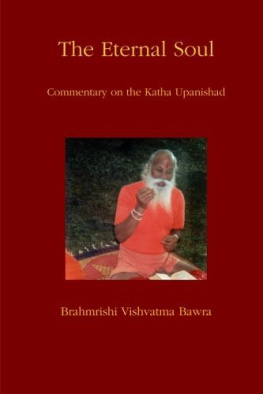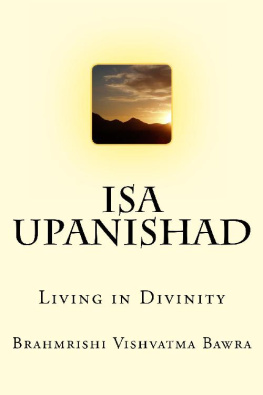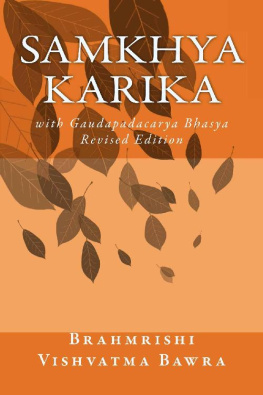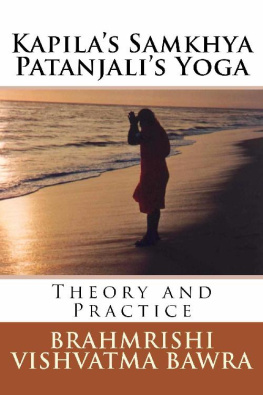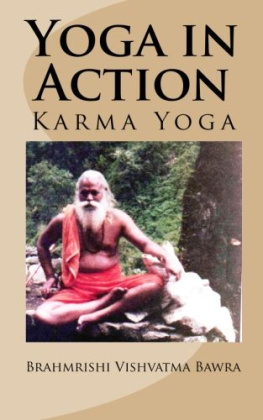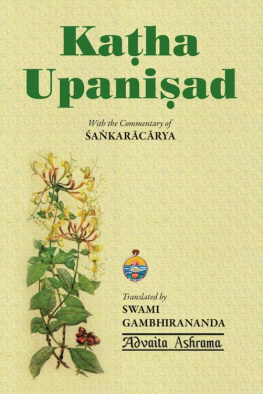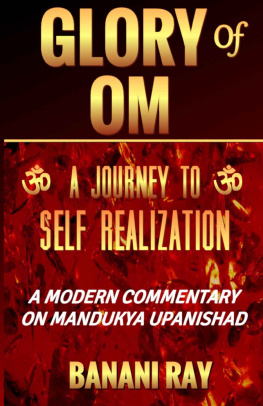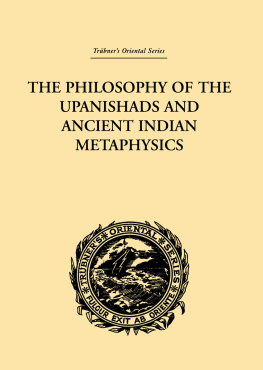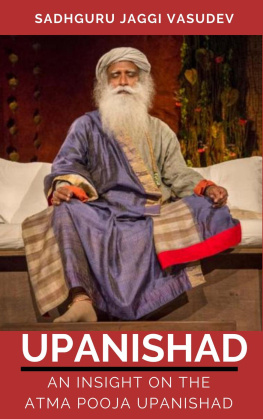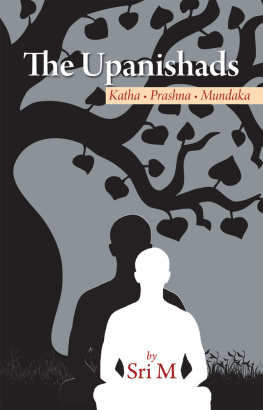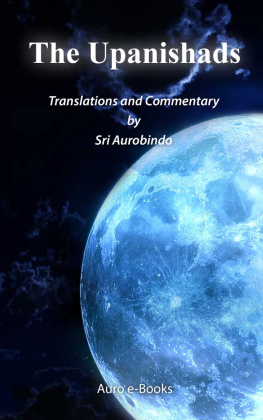Brahmrishi Vishvatma Bawra - The Eternal Soul: Commentary on the Katha Upanishad
Here you can read online Brahmrishi Vishvatma Bawra - The Eternal Soul: Commentary on the Katha Upanishad full text of the book (entire story) in english for free. Download pdf and epub, get meaning, cover and reviews about this ebook. year: 2012, publisher: Brahmrishi Yoga Publications, genre: Religion. Description of the work, (preface) as well as reviews are available. Best literature library LitArk.com created for fans of good reading and offers a wide selection of genres:
Romance novel
Science fiction
Adventure
Detective
Science
History
Home and family
Prose
Art
Politics
Computer
Non-fiction
Religion
Business
Children
Humor
Choose a favorite category and find really read worthwhile books. Enjoy immersion in the world of imagination, feel the emotions of the characters or learn something new for yourself, make an fascinating discovery.
- Book:The Eternal Soul: Commentary on the Katha Upanishad
- Author:
- Publisher:Brahmrishi Yoga Publications
- Genre:
- Year:2012
- Rating:5 / 5
- Favourites:Add to favourites
- Your mark:
- 100
- 1
- 2
- 3
- 4
- 5
The Eternal Soul: Commentary on the Katha Upanishad: summary, description and annotation
We offer to read an annotation, description, summary or preface (depends on what the author of the book "The Eternal Soul: Commentary on the Katha Upanishad" wrote himself). If you haven't found the necessary information about the book — write in the comments, we will try to find it.
Brahmrishi Vishvatma Bawra: author's other books
Who wrote The Eternal Soul: Commentary on the Katha Upanishad? Find out the surname, the name of the author of the book and a list of all author's works by series.
The Eternal Soul: Commentary on the Katha Upanishad — read online for free the complete book (whole text) full work
Below is the text of the book, divided by pages. System saving the place of the last page read, allows you to conveniently read the book "The Eternal Soul: Commentary on the Katha Upanishad" online for free, without having to search again every time where you left off. Put a bookmark, and you can go to the page where you finished reading at any time.
Font size:
Interval:
Bookmark:
The Eternal Soul
Commentary on the Katha Upanishad
From Lectures of
Brahmrishi Vishvatma Bawra
Compiled and Edited by
William F. Milcetich
Yogendra
Brahmrishi Yoga Publications
Publisher: Brahmrishi Yoga Publications
BrahmrishiYoga.org
Date: June 2009.
Brahmrishi Yoga Publications
All rights reserved
No part of this book may be used or reproduced in any manner without written permission, except in the case of brief quotations embodied in critical articles and reviews.
Printed in United States of America
Library of Congress Control Number: 2009905742
ISBN: 978-1-4486-0717-4
Acknowledgement
First, I am eternally grateful to my Guru. His knowledge and insight ha ve provided a shelter for my life.
Next, I would like to offer gratitude to Didi Krishan Kanta who dedicated hours translating the hymns of this Upanishad from Sanskrit to English. Her skills in Sanskrit grammar unlocked many myste r ies of these ancient hymns. Her efforts allowed the meaning to shine forth. Additionally, she offered guidance and direction for completing the last two sections of the commentary and discussion of this Upanishad.
I would like to thank Lisa Thiel and Kathe Davis, for their time, d e tailed edits, and love of knowledge. This book is in answer to Kathes question about the eternal nature of the soul. Special thanks to Julie Tamarkin, whose fresh eyes and eagerness through repeated readings , ha s tened the project and clarified the text. Finally, to my wife Margot, who edited and encouraged the work, remaining determined whenever the e f fort lacked inspiration.
With loving gratitude to all,
Yogendra
Blessings
Yogendra, I am glad you felt the zeal and enthusiasm to work on our Gurus lectures on S mkhya , Yoga, and now the Upan i shads. I am proud of your dedication and devotion, which has made you one with your own inner self and that of your Guru. I wish and pray to Mother Goddess that She continues to bestow the gifts of knowledge and work, and the cou r age to remain ded i cated to our Gurus thought while surrendered to his lotus feet.
Brahmvadini Krishan Kanta
President, International Brahmrishi Mission
Virat Nagar , India
February, 2009
Preface
Introduction
Hymns of the Katha Upanishad
The Story of Nachiketas
The Eternal Soul
Preparation for Knowledge
Two Aspects of Brahman
Chariot Analogy
Method of Discrimination
Arise and Awake
Light of the Senses
The Seer of All
Supreme Cause
Subtle Body
Individual Form
Evolution, Transmigration and Perfection
The One and the Many
Divine Power
Practice
Appendix: The Mndkya Upanishad
The Meaning of A um
This book is inspired by a series of lectures on the Katha Upan i shad by Brahmrishi Vishvatma Bawra given in Kent , Ohio in 1996. The written commentary consists of both direct pres entation by Swami Bawra and compiled and edited material from other lectures and books listed in the bibliography. During his series of lectures, Swami Bawra introduced the Vedas and Upanishads and co m pleted the Katha Upanishad through the fourth section. The last two sections of commentary are solely from r e searched material.
After Swami Bawras introduction, the presentation begins with a translation of the hymns. Following the original hymns, Swami Bawra presents the setting of Nachiketas meeting with his master Yama, the d e ity of death. A commentary on each hymn starts with Yamas teaching on the eternal soul. This commentary is compiled into chapter sections and topics determined by the editor. Where the chapter or topic breaks are consistent with previous present a tions of the Katha Upanishad , credit is due to the version found in The Principal Upanishads by S. Radhakrishnan.
At the end of the story of Nachiketas, Yama mentions the rel a tionship between the sound of Aum and Brahman . Swami Bawra did not detail these two important concepts in his lectures on the Katha Upanishad , but he had in a previous work called the Science of Pranava Om . The appendix is a condensed version of that know l edge.
To assist the English reader with the pronunciation of fr e quently used Sanskrit terms, letters have been added to the strict transliteration of Sa n skrit to English. For example, citta is written as chitta and puru a as purusha . Additionally, the long vowels of a, i, and u are indicated by the symbols, , , and . Capitalization is always a deliberate choice as there is none in Sanskrit. In this text, Brahman , Isvara , God, and Godhead are capitalized. Traditionally , the pr o noun for formless Brahman is That and with form is He. In this text He is used to indicate both. Further explanation is within the text.
Preface
The Upanishads, a collection of dialogues between teachers and disc i ples, are considered to be the distillation of truth as revealed in the V e das. With devotion, the intellect of the seeker can adopt the same qualities and experience of the teacher who is absorbed in supreme consciousness . Accordingly, the disciple becomes uplifted and is shown the goal of practice, which removes doubt and quickens his or her awakening.
Although the tradition of sitting near a seer was an ancient practice, it continues to this day. We are not alone on the journey to realize truth . When the inner demand and sincerity of a pract i tioner quickens, a teacher comes to aid the process of realization. If fortun ate , that teacher will be a truly realized soul with no pe r sonal interest , and will have the capability to awaken supreme consciousness within his disciple. Brahmrishi Vishvatma Bawra (1934-2002) was that seer for me. Not only did he have a keen i n sight into reality, he had the unique ability to make his insight accessible.
Swami Bawra constantly related his knowledge and experience to the V e das. No matter how unique his insights, he had no inte r est in creating a business, marketing a special technique, or in any other way presenting the spiritual quest as new. His only wish was to share the eternal teachings gathered by the Vedic seers and to assist others in ending their suffering. By purifying and developing the mind and intellect, we gain the same eternal reward first r e vealed by the Vedic seers.
Knowledge is not exclusive to any sect or person; it is the d i vine right of every human being. Knowledge and consciousness are one and the same. W hen one properly directs the intellect toward supreme consciou s ness , the ultimate truth can be known. As my G uru often said , no one can do this for you, but if you use your own intellect, you will see reality th r ough your own self.
Because of my relationship with Swami Bawra , I have no doubt that Vedic knowledge and wisdom are cosmic vibrations, intuitively exper i enced by the seers of old and continuously available to all humankind. In the course of searching out a philosophical truth , Swami Bawra would sit in deep meditation and the knowledge would come to him. When the i n tellect is pure and focused, it is able to intuit and analyze a truth that is unavailable when one is distracted. Eternal truth exists always and b e comes known when the intellect is refined. This he taught, and this has become my own experience.
I was blessed with a deep spiritual awakening in my early twe n ties, and had the opportunity to spend twenty years with Swami Bawra. Now, fo l lowing my retirement from a professional career and having raised my family, I am a ble to focus entirely on his spiritual message. In 2006, I r e searched audio lectures, compiled written material of Swami Bawra, and, by early 2008, completed a commentary on Kapils S mkhya S tras and the first two chapters of Patanjalis Yoga S tras .
Font size:
Interval:
Bookmark:
Similar books «The Eternal Soul: Commentary on the Katha Upanishad»
Look at similar books to The Eternal Soul: Commentary on the Katha Upanishad. We have selected literature similar in name and meaning in the hope of providing readers with more options to find new, interesting, not yet read works.
Discussion, reviews of the book The Eternal Soul: Commentary on the Katha Upanishad and just readers' own opinions. Leave your comments, write what you think about the work, its meaning or the main characters. Specify what exactly you liked and what you didn't like, and why you think so.

